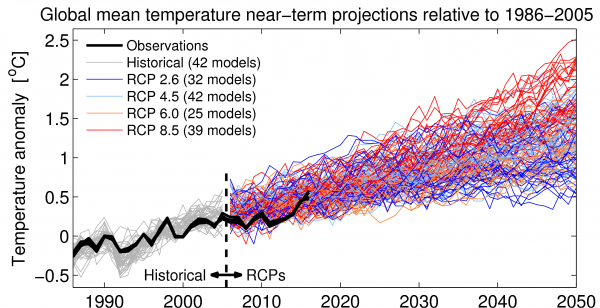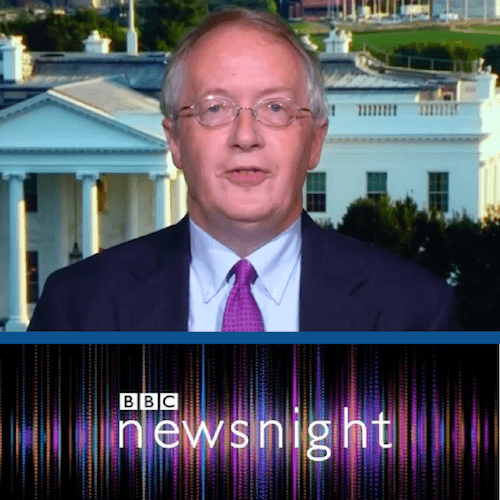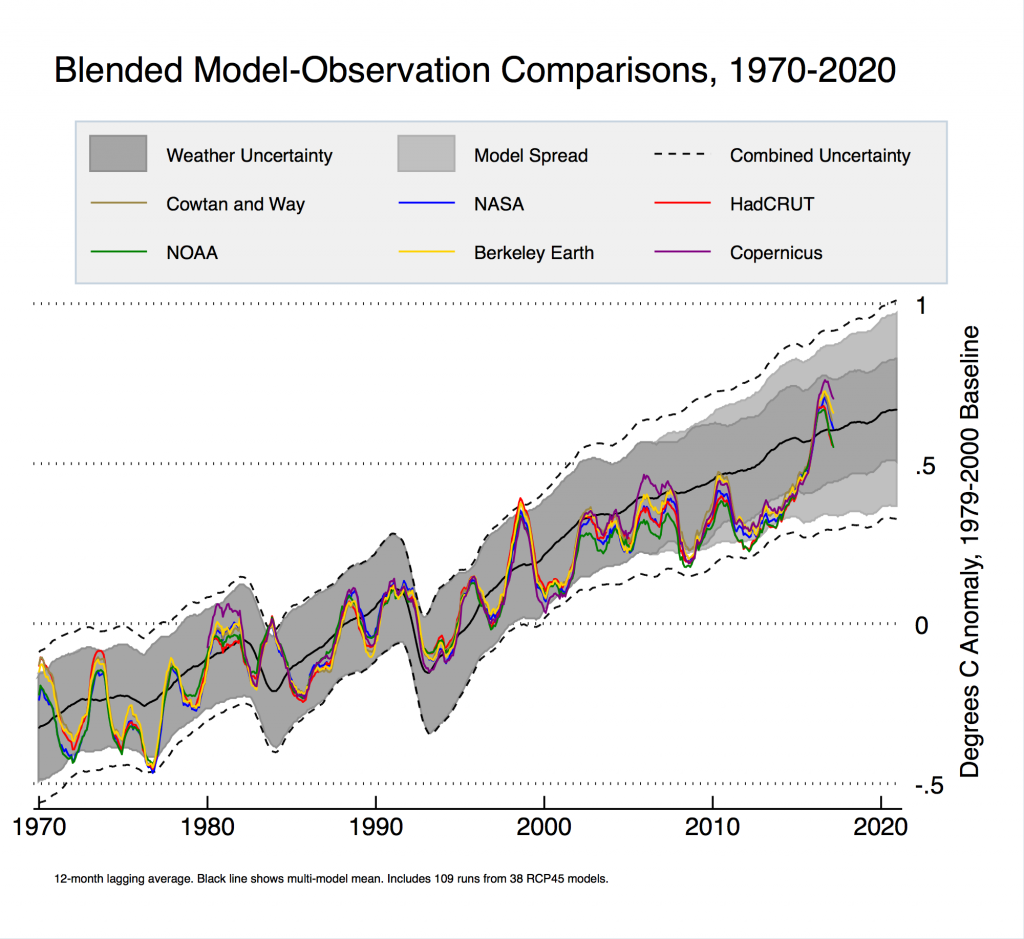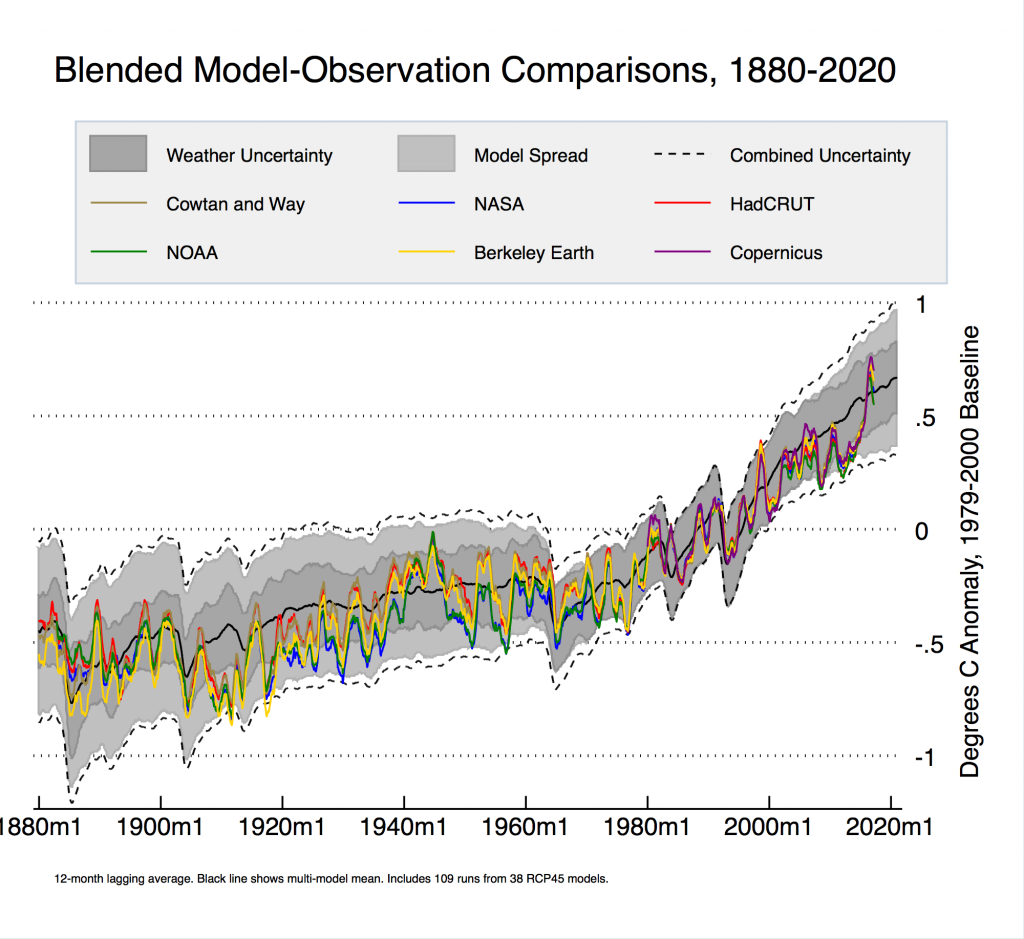

BEHAUPTUNG: The rate of warming according to the data is much slower than the models used by the IPCC
Reto Knutti, Professor, ETH Zürich:
[This comment is taken from an evaluation of a similar claim.]
The statement that climate models overestimate the warming in response to CO2 is incorrect; it is based on either too short time periods that are dominated by natural variability, by the comparison of models with datasets that do not have global coverage, by comparing to models that were run many years ago with emissions and forcings that differed from what actually happened, by the use of oversimplified energy balance models1, or a combination of it. Recent studies have shown that once the changes in climate feedbacks over time2, datasets with full coverage are considered3 and all forcings are considered, the agreement between predicted and observed warming is excellent, even over the recent hiatus period4.
It is remarkable that even projections made decades ago with climate models that were much simpler (and were running on computers that were likely slower than a mobile phone today) were quite accurate5,6,7.
- 1- Knutti and Rugenstein (2015) Feedbacks, climate sensitivity and the limits of linear models, Philosophical Transactions of the Royal Society A
- 2- Armour (2017) Energy budget constraints on climate sensitivity in light of inconstant climate feedbacks, Nature Climate Change
- 3- Richardson et al (2016) Reconciled climate response estimates from climate models and the energy budget of Earth, Nature Climate Change
- 4- Medhaug et al (2017) Reconciling controversies about the ‘global warming hiatus’, Nature
- 5- Stouffer and Manabe (2017) Assessing temperature pattern projections made in 1989, Nature Climate Change
- 6- Fischer and Knutti (2016) Observed heavy precipitation increase confirms theory and early models, Nature Climate Change
- 7- Allen et al (2013) Test of a decadal climate forecast, Nature Geoscience
Patrick Brown, Postdoctoral Research Scientist, Carnegie Institution for Science:
[This comment is taken from an evaluation of a similar claim.]
This argument reached a peak in popularity around 2012/2013 when the „hiatus“ was still ongoing (i.e. when the divergence between observed and modeled global temperature was at its largest). Even then, however, it was shown that you cannot conclude much about sensitivity to CO2 from such short-term fluctuations1. Similarly, Brown et al. (2015)2 showed that decade-long periods without warming are to be expected and that there was/is a 70% chance of seeing at least one 11-year period with no warming between the years of 1993-2050 under a “middle of the road” emissions scenario.
Since then, observed warming has surged and, as of 2016, observations are warmer than the average prediction from climate models (see figures below).
- 1- Marotzke and Forster (2015) Forcing, feedback and internal variability in global temperature trends, Nature
- 2- Brown et al (2015) Comparing the model-simulated global warming signal to observations using empirical estimates of unforced noise, Scientific Reports

Figure – Modeled global surface temperature (RCP 4.5 emissions scenario) compared to observed temperature (NASA GISS). Source

Figure – Updated version of IPCC AR5 Figure 11.25a, showing observations and the CMIP5 model projections relative to 1986-2005. The black lines represent observational datasets (HadCRUT4.5, Cowtan & Way, NASA GISTEMP, NOAA GlobalTemp, BEST). Source
Markus Donat, Research Fellow, University of New South Wales:
[This comment is taken from an evaluation of a similar claim.]
For example, this study by Rahmstorf and colleagues* shows how projections from past IPCC reports (future projections starting in 1990 and 2000) very well predicted the observed temperature changes since then.

Figure – Observed annual global temperature, unadjusted (pink) and adjusted for short-term variations due to solar variability, volcanoes and ENSO (red) compared to the scenarios of the IPCC (blue range and lines from the third assessment, green from the fourth assessment report). Source: Rahmstorf et al (2012)
- Rahmstorf et al (2012) Comparing climate projections to observations up to 2011, Environmental Research Letters
Zeke Hausfather, Research Scientist, Berkeley Earth:
[This comment is taken from an evaluation of a similar claim.]
At the surface models predict a rate of warming of 0.2°C per decade since 1970, while NASA observes warming of around 0.18°C during the same period[…] Similarly, the observations from all the different groups that measure global surface temperatures are well within the envelope of model projections:
Over a longer timeframe, since we first started observing global temperatures in the late 1800s, models have also matched observations fairly well:
- Cowtan et al (2015) Robust comparison of climate models with observations using blended land air and ocean sea surface temperatures, Geophysical Research Letters




